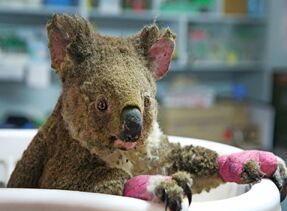澳总理就应对火灾危机不利致歉
|
Australia's Prime Minister Scott Morrison has expressed regret over his handling of the bushfire crisis ravaging the country. The PM has faced mounting criticism over his government's response to the bushfires and its climate policy. Since September, bushfires have killed at least 28 people and destroyed thousands of homes. On Sunday, Mr Morrison conceded there were "things I could have handled on the ground much better".
In recent weeks, Mr Morrison has been heckled by locals when visiting fire-hit communities in the states of New South Wales and Victoria, where the worst blazes are concentrated. In the town of Cobargo in New South Wales, one woman demanded more resources for the fire service, while others called Mr Morrison an "idiot" and said "you won't be getting any votes down here". "These are sensitive environments, they are very emotional environments," Mr Morrison said in a TV interview with ABC. Acknowledging the pressure fire services were facing, Mr Morrison said there was a "new appetite" for the government to take a more direct role in responding to the disaster. The PM said he would seek a royal commission review - a type of public inquiry - into the country's response to the bushfire crisis. Last month, Mr Morrison was criticised for going on holiday to Hawaii as the bushfire crisis worsened. The rising public anger at his absence eventually forced him to cut that trip short. Mr Morrison's government has been accused of not doing enough to address climate change, which experts say could increase the intensity, frequency and scale of bushfires. But in the interview, the PM defended his government's approach, which he said took into account the effect of climate change on the bushfires. "We're living in longer, hotter, drier summers," the PM said. "This is obviously affected by the broader changes in climate." Pressed on his plan to reduce carbon emissions, Mr Morrison insisted his government was on track to "meet and beat" its targets. Under the Paris climate agreement, Australia has pledged to cut emissions by 26% to 28% by 2030 compared to 2005 levels. However, Mr Morrison said a "global solution" was needed to tackle climate change. Tens of thousands of people across Australia took part in climate change protests on Friday. In cities including Sydney, Melbourne and Canberra, demonstrators turned out to press Mr Morrison's government to make a quick transition away from fossil fuels. Each year there is a fire season during the Australian summer, with hot, dry weather making it easy for blazes to start and spread. Natural causes are to blame most of the time, like lightning strikes in drought-affected forests. Dry lightning was responsible for starting a number of fires in Victoria's East Gippsland region in late December, which then traveled more than 20 kilometers in just five hours, according to state agency Victoria Emergency. Humans can also be to blame. NSW police have charged at least 24 people with deliberately starting bushfires, and have taken legal action against 183 people for fire-related offenses since November, according to a police statement. Bushfire conditions eased on Saturday, giving firefighters temporary respite in areas where blazes are still raging. But with more hot weather expected next week, the risk was far from over, authorities warned. Authorities have warned that the huge fires, spurred by high temperatures, wind and a three-year-drought, will persist until there is substantial rainfall. More than 123 fires are still burning across New South Wales, with 50 said to be uncontained. According to NSW Rural Fire Service, more than 2,000 homes have been destroyed so far during this fire season. In Victoria, there were 32 bushfire warnings in place as of Saturday. A firefighter died while tackling a blaze in the state on Saturday, bringing the death toll from this season's bushfires to 28. About half a billion animals have been affected by the fires across NSW, with millions likely dead -- and that's a conservative estimate. That number of total animals affected could be as high as one billion nationwide, according to ecologists from the University of Sydney. The figures for NSW include birds, reptiles, and mammals, except bats. It also excludes insects and frogs, so the real sum is almost certain to be higher, the ecologists said. Almost a third of koalas in NSW may have been killed in the fires, and a third of their habitat has been destroyed, said Federal Environment Minister Sussan Ley. Some species, like koalas, aren't in any immediate danger of extinction because they are spread out across the country, said the university ecologists. But others that live in more niche environments with lower populations, including certain types of frogs and birds, could be wiped out entirely if their habitats are hit by the fires. |









